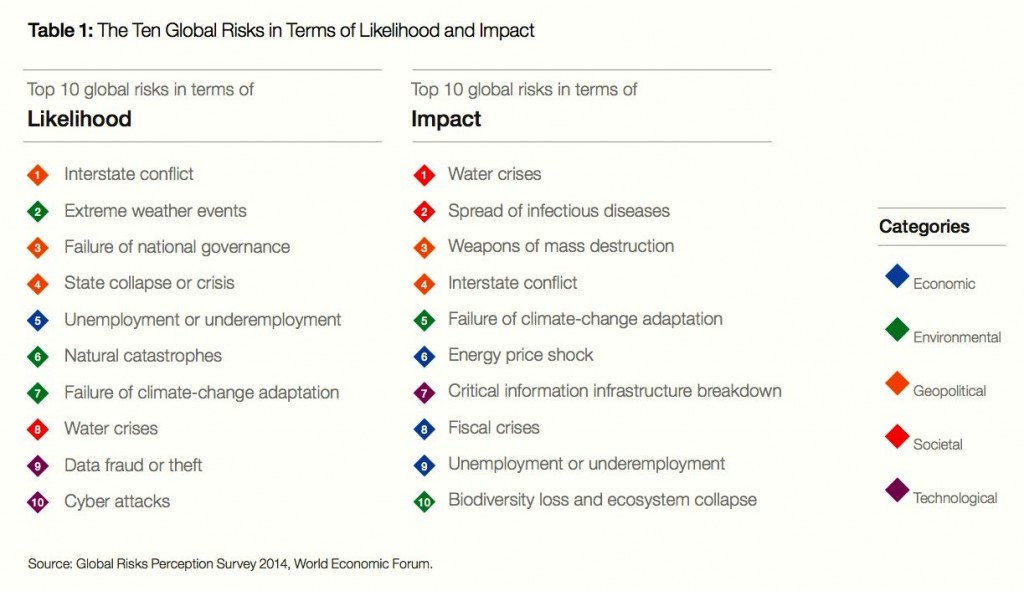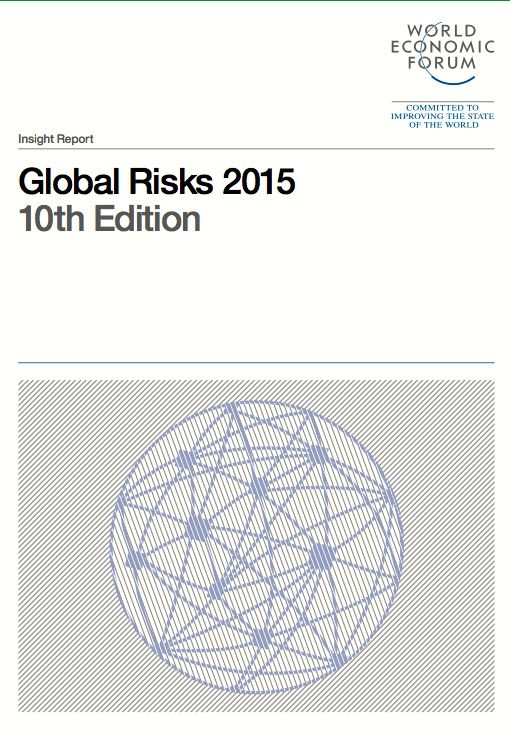
20 Jan, 2015
WEF Global Risks report challenges claimed benefits of tourism
For decades, travel & tourism has positioned itself as an industry of peace, a major contributor to friendship, international understanding, sustainability, poverty-alleviation, economic growth and socio-cultural stability. But a provocative report issued by the World Economic Forum in advance of its annual meeting in Davos this week provides food for thought about whether those theories hold water any more.
The Global Risks report identifies 28 global economic, environmental, societal, geopolitical and technological risks and 13 trends driving those risks. It flags what WEF Founder and Chairman Klaus Schwab calls a complex and uncertain global scenario “resulting from the world’s highly interconnected nature and the increasing speed of change.”
In a devastating conclusion, the report says that “persistent unemployment, ever-rising inequality, unmanaged migration flows and ideological polarization are among the factors stretching societies dangerously close to the breaking point. Social fragility is even threatening geopolitical stability, as breakdowns in cooperation within states make relations between states more difficult. And a quarter-century after the fall of the Berlin Wall, interstate conflict is once again one of the key risks in terms of likelihood and impact. Yet the means through which conflicts can be pursued are growing more varied – from geo-economic tools, such as trade sanctions, to cyber attacks on critical infrastructure, to the potential for a new arms race in lethal autonomous weapons systems.”
 |
It adds, “The world is insufficiently prepared for an increasingly complex risk environment.” Hence, “understanding their implications and raising awareness of the interconnection of risks are at the basis of the Global Risks report.”
Although all the risks and their drivers have been building up over time and pose a clear and present danger to travel & tourism, some of the key ones, especially those related to geopolitics and governance, have never figured prominently on industry conference agendas and programmes. Indeed, if the claims of the International Institute of Peace through Tourism are to be believed, none of this is supposed to have happened. As tourism is growing exponentially, it should have led to a commensurately more peaceful, sustainable world. The WEF report suggests that the correlation between peace & tourism is now a grey area. The fact that France, one of the world’s most popular tourism destinations, is facing geopolitical, socio-cultural and potentially religious divisions, is proof that tourism creates neither safe nor stable societies.
The report says that the biggest threat to the stability of the world in the next 10 years comes from the risk of international conflict, arguably the worst man-made nemesis of travel & tourism. It finds interstate conflict with regional consequences as the number one global risk in terms of likelihood, and the fourth most serious risk in terms of impact. In terms of likelihood, as a risk it exceeds extreme weather events (2), failure of national governance systems (3), state collapse or crisis (4) and high structural unemployment or underemployment (5). It adds, “With geopolitics increasingly influencing the global economy, these risks (interstate conflict with regional consequences, weapons of mass destruction and terrorist attacks) account for three of the five most likely, and two of the most potentially impactful, risks in 2015.”
For the travel & tourism industry, geopolitical risks mean heightened safety & security issues, visa curbs, racial profiling, and more such impediments. The world saw numerous examples of these in 2014.
In another example of direct relevance to travel & tourism, the report says the nearly 900 experts that took part in the Global Risk Perception Survey rated the water crisis as the greatest risk facing the world. Water-guzzling tourists are major contributors to this looming crises. Yet, the travel & tourism industry has no figures on the average per capita water consumption of global travellers. It can identify in copious detail how much visitors spend, right down to the last handbag, but it cannot calculate how much water they consume.
Overall, the report rues the perilous state of the world since the end of the fall of the Berlin wall in 1989. This benchmark raises another question about what role the world’s biggest travel show, the ITB Berlin, has played, or not played as the case might be, in foreseeing these looming crises. The fall of the wall was one factor that significantly boosted the status of ITB Berlin. However, like many other international travel events, including the World Travel & Tourism Council annual summit, the ITB Berlin has evolved into a mutual-admiration club of people preaching to the converted. Political expediency and a desire not to offend, especially the sponsors, means that the traditional comfort zones prevail.
The WEF report’s conclusions reflect a failure of both global leadership as well as institutions such as the UN, IMF, World Bank and the many others set up purportedly to advance global peace and stability. For students of the peace-and-tourism theories, it opens immense opportunities to examine what these institutions have achieved, who should be held accountable for their failures, and whether they need to be either disbanded or restructured to suit the new realities.
The report is not without its flaws. It claims: “Little did the world imagine the possibility of the implosion of global financial markets that plunged the world into a socio-economic crisis from which it is still struggling to emerge.” False. UN organisations such as UNCTAD and ILO, as well as non-governmental organisations grouped under the umbrella of the World Social Forum, for years warned that unbridled neoliberal economic policies, the global big-power struggle, the military-industrial complex and long-simmering conflicts such as those between Israel-Palestine would become the next source of global instability. I attended four regional and global social forums in Thailand, India, Pakistan and Bangladesh. The representatives of the “poor” were right. The “rich”, the primary global decision-makers, have been proven horribly wrong. But it is unlikely they will admit it.
The report should trigger some soul searching about the travel & tourism industry’s own level of credibility and commitment to walk the talk. On the one hand, it claims to be trying to preserve the Planet Earth for the benefit of the future generation. On the other hand, it ignores many of the more immediate problems that are destroying peace, jobs, culture, heritage and the environment today. Clearly, the industry is not leaving the world in better shape for the next generation. If today’s leaders do not wish to be held accountable by the next, they can no longer afford to operate within the comfort zones of job-creation and “resilience”.
The WEF report is rife with quotes about a world heading in the wrong direction, with dangerous implications for the future of travel & tourism. Here are just a few:
(+) This 10th edition of the Global Risks report is published at a time of profound transformations to our global context. Ongoing political, economic, social, environmental and technological developments are challenging many of our underlying assumptions. Across every sector of society, decision-makers are struggling to cope with heightened complexity and uncertainty resulting from the world’s highly interconnected nature and the increasing speed of change.
(+) ….societies are increasingly under pressure from economic, political and social developments including rising income inequality, but also increasing national sentiment. Last but not least, new technologies, such as the Internet or emerging innovations will not bear fruit if regulatory mechanisms at the international and national levels cannot be agreed upon.
(+) The Global Risks Landscape, a map of the most likely and impactful global risks, puts forward that, 25 years after the fall of the Berlin Wall, “interstate conflict” is once again a foremost concern. However, 2015 differs markedly from the past, with rising technological risks, notably cyber attacks, and new economic realities, which remind us that geopolitical tensions present themselves in a very different world from before. Information flows instantly around the globe and emerging technologies have boosted the influence of new players and new types of warfare. At the same time, past warnings of potential environmental catastrophes have begun to be borne out, yet insufficient progress has been made – as reflected in the high concerns about failure of climate-change adaptation and looming water crises in this year’s report.
(+) These multiple cross-cutting challenges can threaten social stability, perceived to be the issue most interconnected with other risks in 2015, and additionally aggravated by the legacy of the global economic crisis in the form of strained public finances and persistent unemployment. The central theme of profound social instability highlights an important paradox that has been smouldering since the crisis but surfaces prominently in this year’s report. Global risks transcend borders and spheres of influence and require stakeholders to work together, yet these risks also threaten to undermine the trust and collaboration needed to adapt to the challenges of the new global context.
(+) The interconnections between geopolitics and economics are intensifying because states are making greater use of economic tools, from regional integration and trade treaties to protectionist policies and cross-border investments, to establish relative geopolitical power. This threatens to undermine the logic of global economic cooperation and potentially the entire international rule-based system.
(+) While increased interdependencies have brought the world closer together, the Global Risks report series emphasizes the other side of the coin: as people’s lives are becoming more complex and more difficult to manage, businesses, governments and individuals alike are being forced to decide upon courses of action in an environment clouded by multiple layers of uncertainty. Indeed, understanding their implications and raising awareness of the interconnection of risks are at the basis of the Global Risks report.
(+) Ten years of “doing risks” has also led to the recognition that a short-term vision prevents addressing long-term issues. Some slower-moving trends have continued inexorably: the last 10 years have brought conclusive proof that the earth’s climate is changing and that human activities are to blame – yet progress to mitigate greenhouse gas emissions remains frustratingly slow.
The report can be downloaded FREE by clicking here.




Liked this article? Share it!